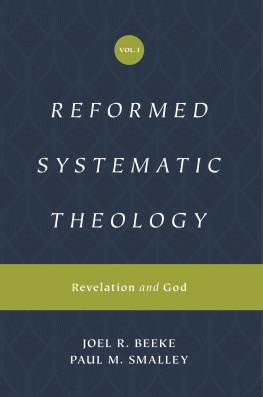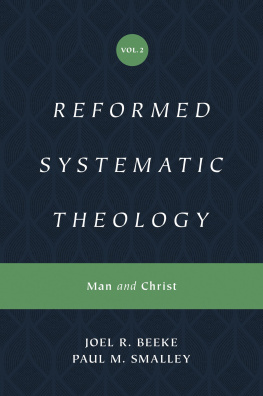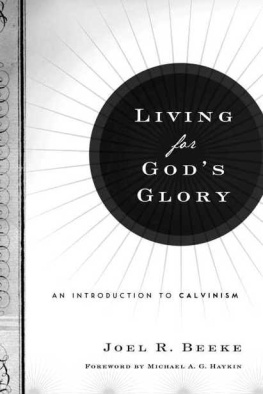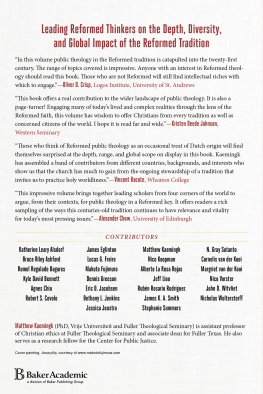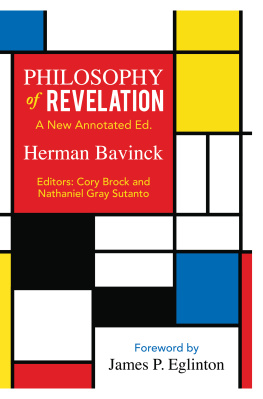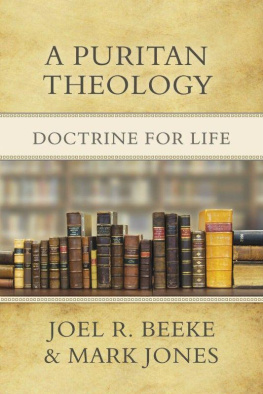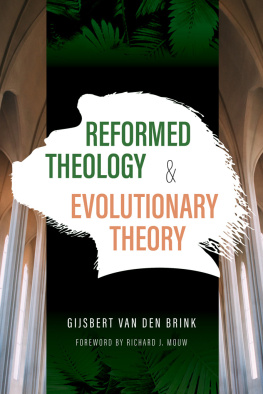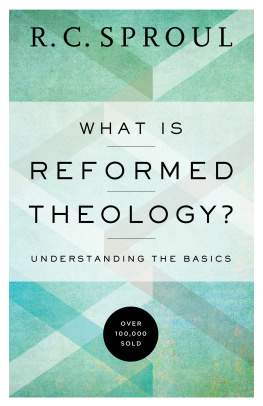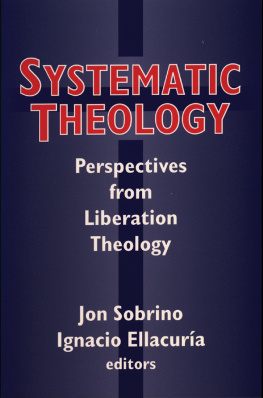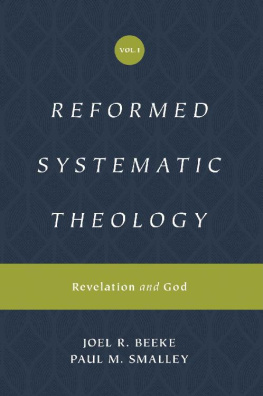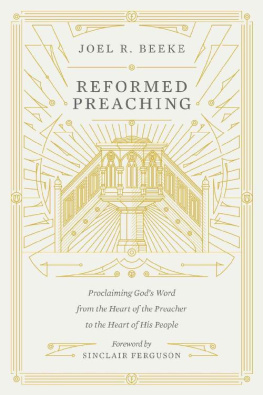Joel R. Beeke - Reformed Systematic Theology: Revelation and God
Here you can read online Joel R. Beeke - Reformed Systematic Theology: Revelation and God full text of the book (entire story) in english for free. Download pdf and epub, get meaning, cover and reviews about this ebook. year: 2019, publisher: Crossway, genre: Religion. Description of the work, (preface) as well as reviews are available. Best literature library LitArk.com created for fans of good reading and offers a wide selection of genres:
Romance novel
Science fiction
Adventure
Detective
Science
History
Home and family
Prose
Art
Politics
Computer
Non-fiction
Religion
Business
Children
Humor
Choose a favorite category and find really read worthwhile books. Enjoy immersion in the world of imagination, feel the emotions of the characters or learn something new for yourself, make an fascinating discovery.
- Book:Reformed Systematic Theology: Revelation and God
- Author:
- Publisher:Crossway
- Genre:
- Year:2019
- Rating:5 / 5
- Favourites:Add to favourites
- Your mark:
- 100
- 1
- 2
- 3
- 4
- 5
Reformed Systematic Theology: Revelation and God: summary, description and annotation
We offer to read an annotation, description, summary or preface (depends on what the author of the book "Reformed Systematic Theology: Revelation and God" wrote himself). If you haven't found the necessary information about the book — write in the comments, we will try to find it.
Reformed Systematic Theology: Revelation and God — read online for free the complete book (whole text) full work
Below is the text of the book, divided by pages. System saving the place of the last page read, allows you to conveniently read the book "Reformed Systematic Theology: Revelation and God" online for free, without having to search again every time where you left off. Put a bookmark, and you can go to the page where you finished reading at any time.
Font size:
Interval:
Bookmark:
The L ord Our God Is One L ord
We often think of Gods oneness in terms of his uniqueness as the only God, but there is more to what the Bible reveals about his unity.
The Biblical Doctrine of Divine Simplicity
We may start our thinking about Gods simplicity with Christs statement, God is a Spirit (John He cannot be anything other than wise, powerful, and good.
Therefore, Gods simplicity means that he has no parts, and his attributes and essence are all one in him.
This simple God reveals himself in the gospel as the triune God. God the Father is pure light without change or shadow (James 1:17). God the Son, incarnate in Jesus Christ, not only brings the light, he is the light (John 8:12). For those united to him by a Spirit -w orked faith, Christ is the way, the truth, and the life (14:6). He is our wisdom, righteousness, sanctification, and redemption (1 Cor. 1:30). Christ is called, The Lord Our Righteousness (Jer. 23:6). Similarly, we may trust God the Holy Spirits witness to Christ in the Word because the Spirit is truth (1 John 5:6). The Spirit of Christ gives life to those in whom he dwells because the Spirit is life (Rom. 8:10). Since God is simple in his being, when the Father, the Son, and the Holy Spirit give us saving grace, in a mysterious sense, God gives us himselfnot by making us divine, but by granting us union and communion with himself.
The Whole Doctrine of God and Divine Simplicity
Gods simplicity correlates logically with other truths revealed in the Word of God to form a coherent view of him.
Deuteronomy
The simplicity of God also correlates with his independence and self -e xistence as I Am (Ex. Therefore, he is characterized by simplicity.
Gods simplicity commends biblical balance in adoring his attributes. Since the Scriptures teach us that God is spirit, light, and love, we should never dwell exclusively on one attribute to the neglect of others. Both theology and doxology should reflect the full spectrum of divine perfections. If we emphasize Gods sovereignty to the neglect of his mercy, or his love to the detriment of his justice, or his presence to the loss of his incomprehensibility, we will increasingly worship a false god instead of the Lord.
The simplicity of God shines most brightly at the cross of Christ. There, at the climax of his redemptive work, Christ glorified not one but all the attributes of God.
The Historical Christian Affirmation of Divine Simplicity
The doctrine of divine simplicity is part of the theological legacy of the ancient church. Irenaeus said, He is a simple, uncompounded Being, without diverse members, and altogether like, and equal to Himself, since He is wholly understanding, and wholly spirit, and wholly thought, and wholly intelligence, and wholly reason, and wholly hearing, and wholly seeing, and wholly light, and the whole source of all that is good.
Though we do not write as philosophers, we must respond to the modern critique from a biblical and theological perspective.
Objections to Divine Simplicity
A number of charges are pressed against the doctrine of Gods simplicity. We will consider and respond to four.
We believe that there are good exegetical grounds for the idea that God is his attributes. When John writes that God is light and God is love, his contextual concern was to demonstrate that God is so closely identified with holiness and love that it is impossible to know him and fellowship with him while walking in the darkness of unrepentant sin, in particular, in hatred for ones brother (1 John 1:510; 4:711, 16). Without contradicting statements that God has love (v. 12), John went further to say that God is love. Someone might take this as a metaphor, but love is not a physical thing or process, such as fire, that suggests a metaphor when identified with God (Deut. 4:24). Love is a personal attribute, attitude, and action, and John here identifies divine love with God himself. It is not a forced reading of the text to understand John as saying, Those who have been born of God and know God will certainly love one another, for Gods very being is love.
Respected commentators have drawn this conclusion. This is a solid exegetical basis for the doctrine of simplicity.
Objection 2: The doctrine of divine simplicity reduces God to a
The objection mistakenly reasons from properties of beings as if we could ascribe them to God univocally.
When we say, God is love, we are not attributing to God the universal property of love, but the unique divine love that only God hasbecause God is that love.
The doctrine of divine simplicity shows us that Gods attributes are not things or principles, but they are the personal God himself. We never need to relate to God as if he were an impersonal justice, a blind power, or a love that consists of sheer emotion. In the divine, we do not encounter mere justice, but the just and righteous Lord; not mere power, but the almighty Father, Son, and Holy Spirit; not mere love, but the loving and kind God.
14:1011 ).
Practical Applications of Divine Simplicity
Gods simplicity is one of the most mind -b oggling attributes ascribed to him. The difficulty of discussing it may make it seem remote from the Christian life. On the contrary, it is richly practical.
First, divine simplicity gives us assurance that wherever God is present, he is fully present with all his attributes . Gods perfections are not diffused throughout space in a diluted fashion; neither are they separable from one another. Therefore, we must fear him, for all of God is always with us. We constantly dwell in the presence of the infinite, eternal, and unchangeable God of wisdom, power, justice, and love. This also engenders hope. We may call upon him through Christ with complete confidence that all of God is with his children for their good.
Second, divine simplicity promotes sincere evangelical holiness and love . When the Lord revealed his simplicity in statements such as God is light and God is love, he did not place them in theoretical discourses, but in admonitions to practical Christian living. Consider these statements in their contexts:
This then is the message which we have heard of him, and declare unto you, that God is light, and in him is no darkness at all. If we say that we have fellowship with him, and walk in darkness, we lie, and do not the truth: but if we walk in the light, as he is in the light, we have fellowship one with another, and the blood of Jesus Christ his Son cleanseth us from all sin (1 John 1:57 ).
Beloved, let us love one another: for love is of God; and every one that loveth is born of God, and knoweth God. He that loveth not knoweth not God; for God is love (1 John 4:78 ).
The knowledge of Gods simplicity, then, stimulates Christian If we truly know this God who is what he is, then we will demonstrate it by walking with him and becoming like him. God is so completely identified with his light and love that it is impossible to know him without walking in light and love.
A life characterized by simplicity and godly sincerity lays a foundation for a good conscience before God (2 Cor.
Third, divine simplicity means that no fruit of the Spirit can be separated from any other in the image of God . There is profound unity in holiness, for it faintly reflects the simplicity of God. Love is patient and kind; love is humble; love is joyful, righteous, and true; love is strong to endure through all things (1 Cor. Let us, therefore, pursue holistic godliness, for that is Godlikeness.
Sing to the Lord
Gods Oneness and Simplicity
Eternal God! Almighty Cause
Of earth and seas, and worlds unknown;
All things are subject to Thy laws,
All things depend on Thee alone.
Thy glorious being singly stands,
Font size:
Interval:
Bookmark:
Similar books «Reformed Systematic Theology: Revelation and God»
Look at similar books to Reformed Systematic Theology: Revelation and God. We have selected literature similar in name and meaning in the hope of providing readers with more options to find new, interesting, not yet read works.
Discussion, reviews of the book Reformed Systematic Theology: Revelation and God and just readers' own opinions. Leave your comments, write what you think about the work, its meaning or the main characters. Specify what exactly you liked and what you didn't like, and why you think so.

